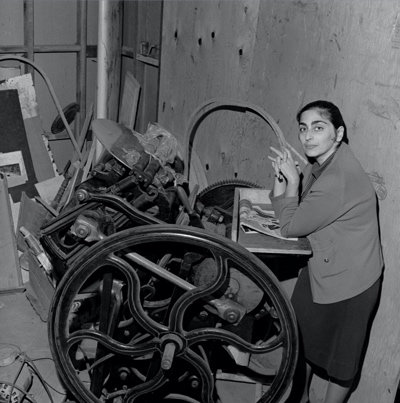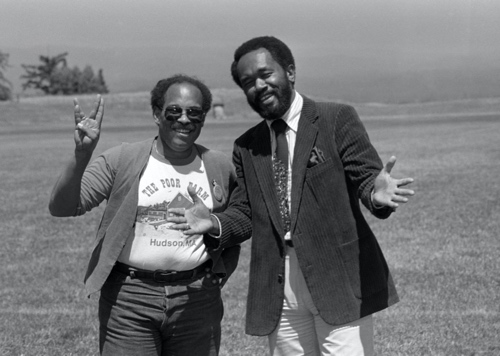Campus News
‘Seeds of Something Different’ explores campus’s trailblazing history
The 925-page book was inspired by a desire to share the rich treasure trove of oral history and collection of photos and campus posters with the public. It features more than 200 narrators as well as 250 images.

Screenshot

From its beginnings in 1965 as a bold experiment in public higher education to its current status as a leading research university, UC Santa Cruz has experienced many transformations.
Its twists and turns are explored in depth in the new two-volume book Seeds of Something Different: An Oral History of the University of California, Santa Cruz. The 925-page work was completed over five years by alumni Irene Reti (Kresge ’82, environmental studies; M.A. ’04, history), Sarah Rabkin (SciCom ’85), and Cameron Vanderscoff (Cowell ’11, history and literature). The editors pored through hundreds of interviews by campus and local leaders collected by the university’s Regional History Project in the University Library’s Special Collections.
Reti said the project was inspired by a desire to share the rich treasure trove of oral history and collection of photos and campus posters with the public. It features more than 200 narrators as well as 250 images.
“This book is a kind of time machine,” Reti said. “[It] is not a dry academic monograph. It reads more like fiction, or a play, a conversation across time.…The tone of the book is by turns celebratory, passionate, humorous, ecstatic; sometimes anguished, angry, elegiac. Our characters are full of both dreams and doubts.”
UC Santa Cruz was founded by people who wanted to change the way learning was done in America, said Vanderscoff in a radio interview. They hoped to give students who weren’t rich a chance to experience the best of a private liberal arts university and a research university.
The beauty of the campus location was a key component from the beginning. “This is a place that feels transformative when you’re there,” Vanderscoff said, explaining that it’s a place where it feels the seeds of something different are possible. “This is a place where people could reinvent themselves, to reinvent learning,” he said.
The book’s cover features a photograph by Ansel Adams, who many people don’t realize was UC Santa Cruz’s first photographer. Ten additional photos by him are included as well as those of 35 other photographers including Joel Levick (Porter ’78, aesthetic studies), Shmuel Thaler, Eric Thiermann (Cowell ’69, literature and visual arts), Jim MacKenzie, and Reti.
The book goes through the rapid cultural changes experienced by the university shortly after its founding in 1965. There are voices talking about the Vietnam War, the civil rights movement, the advent of the women’s and GLBT rights movements, and the interest in preserving the environment and promoting whole foods.
Other voices discuss later aspects of the university’s history, including the growing pains of budgetary constraints, tense college-board relationships, the high cost of living in Santa Cruz, and the ongoing conflict between the founding ideals and changes and constraints imposed by the larger University of California system.
“There is heartbreak here (as some of the early dreams of the founders are tempered by the budgetary realities of the state of California); there is a passion for the stunning redwoods we walk through every day and distress as some of that landscape is sacrificed to build campus infrastructure, as the campus grows and becomes a less intimate place than the one I arrived at in 1978 when there were only 5,000 students,” Reti said. The university now has 18,000 students.
“So much happened that it was difficult to find a coherent and compelling storyline,” Reti said. “We wanted to reach beyond both a narrative of decline (some people believe everything has gone downhill since Chancellor Robert Sinsheimer’s reorganization of the college system in the late 1970s) or a narrative of uncritical celebration of UCSC’s recent prestigious stature as a research university,” she said.
Reti and the other editors did not attempt to reconcile these conflicting viewpoints but instead gave space for readers to come to their own conclusions. “This is the beauty of oral history, which allows for multivocal viewpoints and does not ask us to reconcile them into a seamless message.”
The editors hope the book will lead readers to reflect on the changes that have occurred at UC Santa Cruz and dream about the future. “Our goal is not to sing a song of praise or lament, but say, ‘Well, what’s next?” said Vanderscoff.